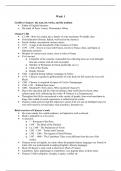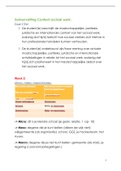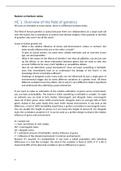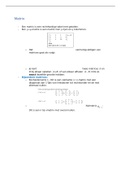Summary Course GW4015MV Sustainable Care Systems
Include lectures!
Week 1: Introduction to the course and the concept of Planetary Health
Learning objectives:
- List the defining characteristics of the Anthropocene
- Outline the historical perspective and milestones that have laid the foundation of
planetary health
- Analyze the concept of planetary health and its distinguishing characteristics in
relation to other fields that explore the intersection of the environment and health
nexus.
- Define, describe and analyze the causal pathways between planetary health
developments and their relationships with health.
Mandatory literature:
Whitmee, S., Haines, A., Beyrer, C., Boltz, F., Capon, A.G., De Souza Dias, B.F., et al. 2015.
Safeguarding human health in the Anthropocene epoche: Report of the Rockefeller
Foundation-Lancet Commission on planetary health. Sections: Executive Summary and
Introduction. Pgs. 7
Executive summary
We have been mortgaging the health of future generations to realise economic and
development gains in the present. By unsustainably exploiting nature’s resources, human
civilisation has flourished but now risks substantial health effects from the degradation of
nature’s life support systems in the future. Health effects from changes to the environment
including climatic change, ocean acidification, land degradation, water scarcity,
overexploitation of fisheries, and biodiversity loss pose serious challenges to the global
health gains of the past several decades and are likely to become increasingly dominant
during the second half of this century and beyond. These striking trends are driven by highly
inequitable, inefficient, and unsustainable patterns of resource consumption and
technological development, together with population growth.
Three categories of challenges that must be addressed to maintain and enhance human
health in the face of increasingly harmful environmental trends.
1. Firstly, conceptual and empathy failures (imagination challenges), such as an over-
reliance on gross domestic product as a measure of human progress, the failure to
account for future health and environmental harms over present day gains, and the
disproportionate effect of those harms on the poor and those in developing nations.
2. Secondly, knowledge failures (research and information challenges), such as failure to
address social and environmental drivers of ill health, a historical scarcity of
transdisciplinary research and funding, together with an unwillingness or inability to
deal with uncertainty within decision making frameworks.
3. Thirdly, implementation failures (governance challenges), such as how governments
and institutions delay recognition and responses to threats, especially when faced
, with uncertainties, pooled common resources, and time lags between action and
effect.
Planetary health offers an unprecedented opportunity for advocacy of global and national
reforms of taxes and subsidies for many sectors of the economy, including energy,
agriculture, water, fisheries, and health.
- Regional trade treaties should act to further incorporate the protection of health in
the near and long term.
- Several essential steps need to be taken to transform the economy to support
planetary health. These steps include:
o a reduction of waste through the creation of products that are more durable
and require less energy and materials to manufacture;
o the incentivisation of recycling, reuse, and repair; and the substitution of
hazardous materials with safer alternatives.
The Sustainable Development Goals provide a great opportunity to integrate health and
sustainability through the judicious selection of relevant indicators relevant to human
wellbeing, the enabling infrastructure for development, and the supporting natural systems,
together with the need for strong governance.
- The landscape, ecosystems, and the biodiversity they contain can be managed to
protect natural systems, and indirectly, reduce human disease risk. Intact and
restored ecosystems can contribute to resilience, for example, through improved
coastal protection (eg, through wave attenuation) and the ability of floodplains and
greening of river catchments to protect from river flooding events by diverting and
holding excess water.
- The growth in urban populations emphasises the importance of policies to improve
health and the urban environment, such as through reduced air pollution, increased
physical activity, provision of green space, and urban planning to prevent sprawl and
decrease the magnitude of urban heat islands.
- The creation of integrated surveillance systems that collect rigorous health,
socioeconomic, and environmental data for defined populations over long time
periods can provide early detection of emerging disease outbreaks or changes in
nutrition and non-communicable disease burden. The improvement of risk
communication to policy makers and the public and the support of policy makers to
make evidence-informed decisions can be helped by an increased capacity to do
systematic reviews and the provision of rigorous policy briefs.
- Health professionals have an essential role in the achievement of planetary health:
working across sectors to integrate policies that advance health and environmental
sustainability, tackling health inequities, reducing the environmental impacts of
health systems, and increasing the resilience of health systems and populations to
environmental change.
Key messages
1. The concept of planetary health is based on the understanding that human health
and human civilisation depend on flourishing natural systems and the wise
stewardship of those natural systems. However, natural systems are being degraded
to an extent unprecedented in human history.
, 2. Environmental threats to human health and human civilisation will be characterised
by surprise and uncertainty. Our societies face clear and potent dangers that require
urgent and transformative actions to protect present and future generations.
3. The present systems of governance and organisation of human knowledge are
inadequate to address the threats to planetary health. We call for improved
governance to aid the integration of social, economic, and environmental policies
and for the creation, synthesis, and application of interdisciplinary knowledge to
strengthen planetary health.
4. Solutions lie within reach and should be based on the redefinition of prosperity to
focus on the enhancement of quality of life and delivery of improved health for all,
together with respect for the integrity of natural systems. This endeavour will
necessitate that societies address the drivers of environmental change by promoting
sustainable and equitable patterns of consumption, reducing population growth, and
harnessing the power of technology for change.
Introduction
The environment has been the foundation for human flourishing.
By most metrics, human health is better today than at any time in history. Humanity’s
progress has been supported by the Earth’s ecological and biophysical systems. The Earth’s
atmosphere, oceans, and important ecosystems such as forests, wetlands, and tundra help
to maintain a constant climate, provide clean air, recycle nutrients such as nitrogen and
phosphorus, and regulate the world’s water cycle, giving humanity freshwater for drinking
and sanitation. The land, seas, and rivers, and the plants and animals they contain, also
provide many direct goods and benefits—chiefly food, fuel, timber, and medicinal
compounds (figure 1).
Alongside the development of public health, the development of agriculture and industry
have been major drivers of human success, harnessing the ability of the Earth to provide
sustenance, shelter, and energy— underpinning the expansion of civilisation.
In essence, humanity has traded off many of the Earth’s supportive and regulating
processes to feed and fuel human population growth and development.
The scale of human alteration of the natural world is difficult to overstate.
- 60% of ecosystem services examined, from regulation of air quality to purification of
water, are being degraded or used unsustainably.
- About a quarter of the global disease burden and more than a third of the burden in
children was attributable to modifiable environmental factors.
, Health impacts of global environmental change can be:
- direct (such as heat stress from climate change),
- secondary (due to the alteration of natural systems), or
- indirect or tertiary effects (for example due to social disruption; figure 3).
The concept of planetary health
If a population attains a given level of health by exploiting the environment unsustainably
then it is likely to be doing so at the expense of other populations—now or in the future, or
both. The environmental impact of populations should therefore be represented in
assessments of progress of human health and wellbeing.
Our definition of planetary health is the achievement of the highest attainable standard of
health, wellbeing, and equity worldwide through judicious attention to the human systems—
political, economic, and social—that shape the future of humanity and the Earth’s natural
systems that define the safe environmental limits within which humanity can flourish.
Put simply, planetary health is the health of human civilisation and the state of the
natural systems on which it depends.
Raudsepp-Hearne, C., Peterson, G. D., Tengö, M., Bennett, E. M., Holland, T., Benessaiah,
K., et al. (2010). Untangling the environmentalist's paradox: why is human well-being
increasing as ecosystem services degrade?. BioScience, 60(8), 576-589. Pgs.12
Abstract
Environmentalists have argued that ecological degradation will lead to declines in the well-
Include lectures!
Week 1: Introduction to the course and the concept of Planetary Health
Learning objectives:
- List the defining characteristics of the Anthropocene
- Outline the historical perspective and milestones that have laid the foundation of
planetary health
- Analyze the concept of planetary health and its distinguishing characteristics in
relation to other fields that explore the intersection of the environment and health
nexus.
- Define, describe and analyze the causal pathways between planetary health
developments and their relationships with health.
Mandatory literature:
Whitmee, S., Haines, A., Beyrer, C., Boltz, F., Capon, A.G., De Souza Dias, B.F., et al. 2015.
Safeguarding human health in the Anthropocene epoche: Report of the Rockefeller
Foundation-Lancet Commission on planetary health. Sections: Executive Summary and
Introduction. Pgs. 7
Executive summary
We have been mortgaging the health of future generations to realise economic and
development gains in the present. By unsustainably exploiting nature’s resources, human
civilisation has flourished but now risks substantial health effects from the degradation of
nature’s life support systems in the future. Health effects from changes to the environment
including climatic change, ocean acidification, land degradation, water scarcity,
overexploitation of fisheries, and biodiversity loss pose serious challenges to the global
health gains of the past several decades and are likely to become increasingly dominant
during the second half of this century and beyond. These striking trends are driven by highly
inequitable, inefficient, and unsustainable patterns of resource consumption and
technological development, together with population growth.
Three categories of challenges that must be addressed to maintain and enhance human
health in the face of increasingly harmful environmental trends.
1. Firstly, conceptual and empathy failures (imagination challenges), such as an over-
reliance on gross domestic product as a measure of human progress, the failure to
account for future health and environmental harms over present day gains, and the
disproportionate effect of those harms on the poor and those in developing nations.
2. Secondly, knowledge failures (research and information challenges), such as failure to
address social and environmental drivers of ill health, a historical scarcity of
transdisciplinary research and funding, together with an unwillingness or inability to
deal with uncertainty within decision making frameworks.
3. Thirdly, implementation failures (governance challenges), such as how governments
and institutions delay recognition and responses to threats, especially when faced
, with uncertainties, pooled common resources, and time lags between action and
effect.
Planetary health offers an unprecedented opportunity for advocacy of global and national
reforms of taxes and subsidies for many sectors of the economy, including energy,
agriculture, water, fisheries, and health.
- Regional trade treaties should act to further incorporate the protection of health in
the near and long term.
- Several essential steps need to be taken to transform the economy to support
planetary health. These steps include:
o a reduction of waste through the creation of products that are more durable
and require less energy and materials to manufacture;
o the incentivisation of recycling, reuse, and repair; and the substitution of
hazardous materials with safer alternatives.
The Sustainable Development Goals provide a great opportunity to integrate health and
sustainability through the judicious selection of relevant indicators relevant to human
wellbeing, the enabling infrastructure for development, and the supporting natural systems,
together with the need for strong governance.
- The landscape, ecosystems, and the biodiversity they contain can be managed to
protect natural systems, and indirectly, reduce human disease risk. Intact and
restored ecosystems can contribute to resilience, for example, through improved
coastal protection (eg, through wave attenuation) and the ability of floodplains and
greening of river catchments to protect from river flooding events by diverting and
holding excess water.
- The growth in urban populations emphasises the importance of policies to improve
health and the urban environment, such as through reduced air pollution, increased
physical activity, provision of green space, and urban planning to prevent sprawl and
decrease the magnitude of urban heat islands.
- The creation of integrated surveillance systems that collect rigorous health,
socioeconomic, and environmental data for defined populations over long time
periods can provide early detection of emerging disease outbreaks or changes in
nutrition and non-communicable disease burden. The improvement of risk
communication to policy makers and the public and the support of policy makers to
make evidence-informed decisions can be helped by an increased capacity to do
systematic reviews and the provision of rigorous policy briefs.
- Health professionals have an essential role in the achievement of planetary health:
working across sectors to integrate policies that advance health and environmental
sustainability, tackling health inequities, reducing the environmental impacts of
health systems, and increasing the resilience of health systems and populations to
environmental change.
Key messages
1. The concept of planetary health is based on the understanding that human health
and human civilisation depend on flourishing natural systems and the wise
stewardship of those natural systems. However, natural systems are being degraded
to an extent unprecedented in human history.
, 2. Environmental threats to human health and human civilisation will be characterised
by surprise and uncertainty. Our societies face clear and potent dangers that require
urgent and transformative actions to protect present and future generations.
3. The present systems of governance and organisation of human knowledge are
inadequate to address the threats to planetary health. We call for improved
governance to aid the integration of social, economic, and environmental policies
and for the creation, synthesis, and application of interdisciplinary knowledge to
strengthen planetary health.
4. Solutions lie within reach and should be based on the redefinition of prosperity to
focus on the enhancement of quality of life and delivery of improved health for all,
together with respect for the integrity of natural systems. This endeavour will
necessitate that societies address the drivers of environmental change by promoting
sustainable and equitable patterns of consumption, reducing population growth, and
harnessing the power of technology for change.
Introduction
The environment has been the foundation for human flourishing.
By most metrics, human health is better today than at any time in history. Humanity’s
progress has been supported by the Earth’s ecological and biophysical systems. The Earth’s
atmosphere, oceans, and important ecosystems such as forests, wetlands, and tundra help
to maintain a constant climate, provide clean air, recycle nutrients such as nitrogen and
phosphorus, and regulate the world’s water cycle, giving humanity freshwater for drinking
and sanitation. The land, seas, and rivers, and the plants and animals they contain, also
provide many direct goods and benefits—chiefly food, fuel, timber, and medicinal
compounds (figure 1).
Alongside the development of public health, the development of agriculture and industry
have been major drivers of human success, harnessing the ability of the Earth to provide
sustenance, shelter, and energy— underpinning the expansion of civilisation.
In essence, humanity has traded off many of the Earth’s supportive and regulating
processes to feed and fuel human population growth and development.
The scale of human alteration of the natural world is difficult to overstate.
- 60% of ecosystem services examined, from regulation of air quality to purification of
water, are being degraded or used unsustainably.
- About a quarter of the global disease burden and more than a third of the burden in
children was attributable to modifiable environmental factors.
, Health impacts of global environmental change can be:
- direct (such as heat stress from climate change),
- secondary (due to the alteration of natural systems), or
- indirect or tertiary effects (for example due to social disruption; figure 3).
The concept of planetary health
If a population attains a given level of health by exploiting the environment unsustainably
then it is likely to be doing so at the expense of other populations—now or in the future, or
both. The environmental impact of populations should therefore be represented in
assessments of progress of human health and wellbeing.
Our definition of planetary health is the achievement of the highest attainable standard of
health, wellbeing, and equity worldwide through judicious attention to the human systems—
political, economic, and social—that shape the future of humanity and the Earth’s natural
systems that define the safe environmental limits within which humanity can flourish.
Put simply, planetary health is the health of human civilisation and the state of the
natural systems on which it depends.
Raudsepp-Hearne, C., Peterson, G. D., Tengö, M., Bennett, E. M., Holland, T., Benessaiah,
K., et al. (2010). Untangling the environmentalist's paradox: why is human well-being
increasing as ecosystem services degrade?. BioScience, 60(8), 576-589. Pgs.12
Abstract
Environmentalists have argued that ecological degradation will lead to declines in the well-











